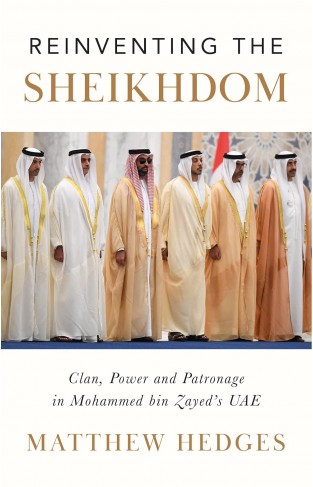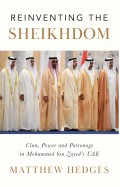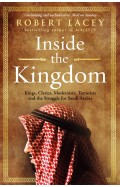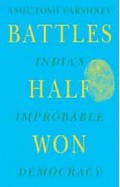- Home
- History
- Middle Eastern
- Reinventing the Sheikhdom: Clan, Power and Patronage in Mohammed bin Zayed's UAE
Reinventing the Sheikhdom: Clan, Power and Patronage in Mohammed bin Zayed's UAE
By: Matthew Hedges
-
Rs 4,670.75
- Rs 5,495.00
- 15%
You save Rs 824.25.
Due to constant currency fluctuation, prices are subject to change with or without notice.
Though the Arab Spring has reverberated through the Middle East, largely leaving a path of destruction, the relative calm in the United Arab Emirates has offered a regional roadmap for stability. Domestic changes since 2000 have significantly altered the country's dynamics, firmly cementing power within Abu Dhabi. While Khalifa bin Zayed succeeded his father as emir of Abu Dhabi and UAE president in 2004, the Emirates' evolution has largely been accredited to Abu Dhabi's crown prince, Mohammed bin Zayed. His reign has been characterised by the rise of the security apparatus and a micromanaged approach to governance. Mohammed bin Zayed's strategy of fortification has focused on pre-empting threats from the UAE's native population, rather than from expatriates or foreign actors. As a result, he has consolidated power, distributing its administration among his tribal and kinship allies. In essence, Mohammed bin Zayed has driven modernisation in order to strengthen his grasp on power. This book explores Mohammed bin Zayed's regime security strategy, illustrating the network of alliances that seek to support his reign and that of his family. In an ever-turbulent region, the UAE remains critical to understanding the evolution of Middle Eastern authoritarian control.
Though the Arab Spring has reverberated through the Middle East, largely leaving a path of destruction, the relative calm in the United Arab Emirates has offered a regional roadmap for stability. Domestic changes since 2000 have significantly altered the country's dynamics, firmly cementing power within Abu Dhabi. While Khalifa bin Zayed succeeded his father as emir of Abu Dhabi and UAE president in 2004, the Emirates' evolution has largely been accredited to Abu Dhabi's crown prince, Mohammed bin Zayed. His reign has been characterised by the rise of the security apparatus and a micromanaged approach to governance. Mohammed bin Zayed's strategy of fortification has focused on pre-empting threats from the UAE's native population, rather than from expatriates or foreign actors. As a result, he has consolidated power, distributing its administration among his tribal and kinship allies. In essence, Mohammed bin Zayed has driven modernisation in order to strengthen his grasp on power. This book explores Mohammed bin Zayed's regime security strategy, illustrating the network of alliances that seek to support his reign and that of his family. In an ever-turbulent region, the UAE remains critical to understanding the evolution of Middle Eastern authoritarian control.
Reinventing the Sheikhdom: Clan, Power and Patronage in Mohammed bin Zayed's UAE
By: Matthew Hedges
Rs 4,670.75 Rs 5,495.00 Ex Tax :Rs 4,670.75
Zubin Mehta: A Musical Journey (An Authorized Biography)
By: VOID - Bakhtiar K. Dadabhoy
Rs 892.50 Rs 1,050.00 Ex Tax :Rs 892.50
Einstein His Life and Universe - (PB)
By: Walter Isaacson
Rs 2,695.50 Rs 2,995.00 Ex Tax :Rs 2,695.50
The Origins of Political Order From Prehuman Times to the French RevolutioN
By: Francis Fukuyama
Rs 4,045.50 Rs 4,495.00 Ex Tax :Rs 4,045.50
Battles Half Won : Indias Improbable Democracy
By: Ashutosh Varshney
Rs 3,565.75 Rs 4,195.00 Ex Tax :Rs 3,565.75
Curzon's India: Networks of Colonial Governance, 1899-1905
By: Dhara Anjaria
Rs 845.75 Rs 995.00 Ex Tax :Rs 845.75
A Brief History of The Third Reich: The Rise and Fall of the Nazis - Paperback
By: Martyn Whittock
Rs 1,695.75 Rs 1,995.00 Ex Tax :Rs 1,695.75
US Policy in Afghanistan and Iraq
By: Seyom Brown & Robert H. Scales
Rs 2,375.75 Rs 2,795.00 Ex Tax :Rs 2,375.75
The Peacemakers: India and the Quest for One World
By: Manu Bhagwan
Rs 722.50 Rs 850.00 Ex Tax :Rs 722.50
The Invisible Bridge: The Fall of Nixon and the Rise of Reagan
By: Rick Perlstein
Rs 1,827.50 Rs 2,150.00 Ex Tax :Rs 1,827.50
Einstein His Life and Universe - (PB)
By: Walter Isaacson
Rs 2,695.50 Rs 2,995.00 Ex Tax :Rs 2,695.50
Math Mind - The Simple Path to Loving Math
By: Shalinee Sharma
Rs 4,945.50 Rs 5,495.00 Ex Tax :Rs 4,945.50
The Colony: Longlisted for the Booker Prize 2022
By: Audrey Magee
Rs 1,780.75 Rs 2,095.00 Ex Tax :Rs 1,780.75
Sherlock Holmes: The Stockbroker's Clerk (Easy Classics): 19
By: Arthur Conan Doyle
Rs 1,347.50 Rs 2,695.00 Ex Tax :Rs 1,347.50
The Science of Breakable Things - Paperback
By: Tae Keller
Rs 1,525.75 Rs 1,795.00 Ex Tax :Rs 1,525.75
Tess of the D'Urbervilles (Macmillan Collectors Library)
By: Thomas Hardy
Rs 2,515.50 Rs 2,795.00 Ex Tax :Rs 2,515.50
Healing the Shame that Binds You - Recovery Classics Edition
By: John Bradshaw
Rs 3,295.00 Ex Tax :Rs 3,295.00
Don Quixote (Wordsworth Classics)
By: Miguel De Cervantes Saavedra
Rs 1,615.50 Rs 1,795.00 Ex Tax :Rs 1,615.50
Illuminated: Autism and All the Things I've Left Unsaid
By: Melanie Sykes
Rs 2,695.50 Rs 2,995.00 Ex Tax :Rs 2,695.50
Smart Flash Cards – Colours, Shapes and Tell the Time
By: SHAMA ZAIN
Rs 625.50 Rs 695.00 Ex Tax :Rs 625.50
Zubin Mehta: A Musical Journey (An Authorized Biography)
By: VOID - Bakhtiar K. Dadabhoy
Rs 892.50 Rs 1,050.00 Ex Tax :Rs 892.50
Reinventing the Sheikhdom: Clan, Power and Patronage in Mohammed bin Zayed's UAE
By: Matthew Hedges
Rs 4,670.75 Rs 5,495.00 Ex Tax :Rs 4,670.75
Einstein His Life and Universe - (PB)
By: Walter Isaacson
Rs 2,695.50 Rs 2,995.00 Ex Tax :Rs 2,695.50














-120x187.jpg?q6)







-120x187.jpg?q6)






























